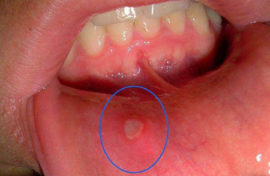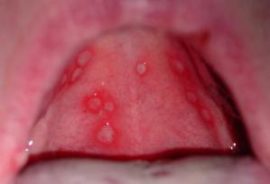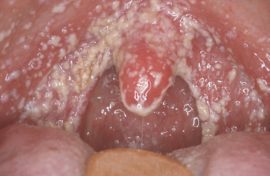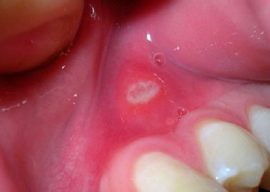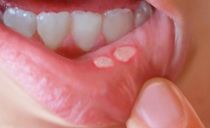Can I get stomatitis and how to protect myself
Stomatitis is a disease in which an inflammatory process develops on the oral mucosa. It was believed that stomatitis is a childhood disease that is usually diagnosed in babies, but today growing number of adultsthat face him.
Content
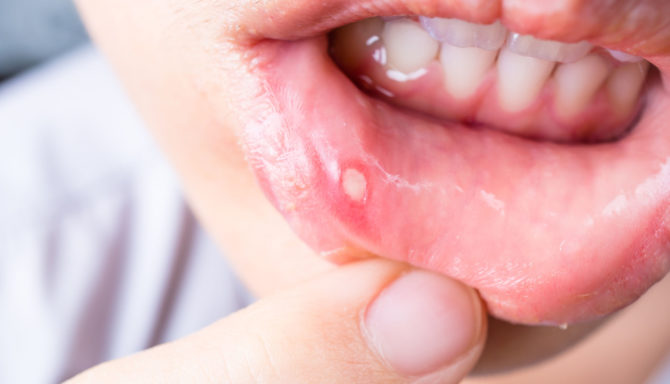
Classification
Since the disease is quite common, many are interested in whether stomatitis is contagious and how dangerous it is. To answer this question, it is necessary to consider its various forms.
Stomatitis can be of several types:
- viral;
- bacterial;
- fungal;
- aphthous;
- traumatic.
Viral form
A disease of a viral nature is caused by the herpes simplex virus, influenza and chickenpox.
It is accompanied by the following symptoms:
- fever;
- the appearance on the mucous membrane of blisters;
- erosion in places where there was a rupture of the bubble.
Given the nature of the disease, the answer to the question whether viral stomatitis is contagious or not is positive. It can go from person to person in several ways:
- household way (through common things, dishes, toys);
- airborne droplet;
- contact (including through saliva with a kiss).
There are several groups that include people at risk of getting sick:
- people with reduced immunity, including as a result of taking medications;
- children;
- patients with diabetes
- people who do not adhere to a healthy lifestyle.
Viral stomatitis is accompanied by the classic signs of a viral disease - in children, the temperature can rise to 41 degrees. How long does it take for the first symptoms to occur? After two days in the oral cavity there are burning sensations, pain, the intensity of which increases with food. Bubbles appear on the mucous membrane, they burst and ulcers with a white film appear in their place.
This form is very common in children, as it spreads at an incredible rate in a children's team.
How is stomatitis transmitted from child to child? Children forget to observe the rules of hygiene, they do not always wash their hands, like to lick their fingers and toys, do not hesitate to show emotions towards each other with hugs and kisses. Therefore, in the kindergarten or on the playground, the baby can quickly transmit the infection. In such situations, adults are interested in whether stomatitis is contagious in children. Yes, an adult can become infected by a baby - just kiss the baby, so you must follow all safety precautions. Although the dangerous phase does not last long - about 10 days, you must protect yourself.
Bacterial form
Viral stomatitis is transmitted by airborne droplets, but there are other forms that can be infected in the same way.
Bacterial stomatitis is contagious and can be transmitted by contact or by airborne droplets. Faced with it are usually people with poor immunity. Therefore, if there is a person in the environment who suffers from stomatitis, and you are afraid that stomatitis is contagious in adults, then you should definitely apply protective measures: you should not kiss this person until the disease has passed, you should not use one dishware or things. Due to the ease of transmission by contact, it is often found in children.
In adults with normal immunity, this type of disease can develop only in cases of direct infection in damaged areas of the mucosa.
The bacterial form is provoked by activation in the body of staphylococci and streptococci. The disease is characterized by the following clinical picture:
- swelling of the oral cavity;
- hardening of the sky;
- the appearance of an unpleasant odor;
- general weakness;
- nausea, vomiting.
Fungal (candidiasis) stomatitis
This is another type of stomatitis, high infectiousness. The causative agent is Candida. It is always in the body, however, it begins to aggressively manifest itself only under certain circumstances. Activation of the fungus may be due to the use of antibacterial drugs, a decrease in immunity, hormonal failure or diabetes.
The disease manifests itself in the following symptoms:
- friability of the skin;
- swelling of the mucosa;
- the appearance in the oral cavity of sores covered with white plaque.
Usually the fungal form is found in toddlers and the elderly. It can spread quite easily, so you need to know how stomatitis of this form is transmitted.
Candid stomatitis can be infected by a baby from an infected mother. This happens if a woman at the time of birth has an untreated vaginal thrush. The first manifestations are observed only a few days after the birth.
It is also necessary to note how candidal stomatitis is transmitted in adults - infection occurs through contact-household means: through sexual contact, when using personal items and even if you kiss an infected person - in any situations when the fungus enters the mucous membrane.
Aphthous
Aphthous stomatitis can develop due to many reasons. Is it possible to get infected with this form of stomatitis, depends on this. Only infectious aphthous stomatitis is contagious. The name is due to the fact that the course of the disease is accompanied by the occurrence of aft - painful ulcers.
Possible reasons why it occurs include:
- infections (measles, diphtheria, etc.);
- deficiency of vitamins (A, B, C, as well as selenium, zinc, iron);
- inflammatory diseases of the teeth and gums;
- gastrointestinal diseases;
- constant stress.
Most often, aphthous stomatitis is diagnosed in young children. In the viral form, the onset of ulcers is accompanied by inflammation of the tonsils and other manifestations of the viral infection.
Traumatic form
This type occurs with any traumatic lesion of the soft tissues. This may be a mechanical, chemical or thermal injury.
Traumatic stomatitis is not contagious and cannot be transmitted in any way.. It is also difficult to talk about risk groups - anyone can get injured, regardless of age or type of activity. It can develop in people who prefer hard and spicy foods, as well as those who have the habit of biting the inside of their cheeks. It can also develop with improperly performed dental procedures - a badly sharpened tooth can become the cause.
People who have braces are susceptible to this disease.
Despite the fact that most types of traumatic stomatitis cannot be infected, they can become chronic.
Prevention
As you can see, stomatitis is transmitted in almost any form, so to avoid infection, you must adhere to the following recommendations:
- Compliance with the rules of oral hygiene. To prevent mucosal injuries, brushing should be preferred with soft and medium hard bristles. Care must be taken in flossing. Experts recommend choosing toothpastes that do not contain sodium lauryl sulfate. You can only use your toothbrush.
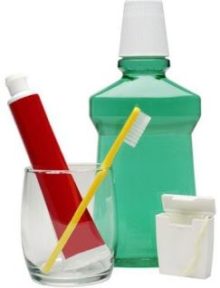 Exclusion from the diet of aggressive foods. Hard foods, such as chips or crackers, can cause mucosal injury. Hot drinks, alcohol-containing drinks, salty and spicy can cause a reaction with the mucosa, which will result in stomatitis.Also, the occurrence of the disease can lead to the use of allergenic products. Vegetables and fruits should be washed thoroughly. You should not eat poorly processed meat and fish, products with an expired shelf life.
Exclusion from the diet of aggressive foods. Hard foods, such as chips or crackers, can cause mucosal injury. Hot drinks, alcohol-containing drinks, salty and spicy can cause a reaction with the mucosa, which will result in stomatitis.Also, the occurrence of the disease can lead to the use of allergenic products. Vegetables and fruits should be washed thoroughly. You should not eat poorly processed meat and fish, products with an expired shelf life.- If necessary, visit the dentist to correct dentures that interfere, as well as eliminate chips and sharp edges of the teeth - this will reduce the likelihood of injury.
- Balanced diet. To increase immunity, you should take a vitamin complex in order to enhance the protective functions of the body. Be sure to follow the general rules of hygiene: wash your hands not only before eating, but during the day and do not use other people's personal things.
- Exclusion of stress factors.
- Refusal of bad habits: both nicotine and alcohol are risk factors for the development of stomatitis.
- The exception of self-medication. This is especially true of hormonal drugs and antibacterial drugs.
- You should not use uncontrolled (without consulting a doctor) folk recipes. Some of them are quite aggressive and can cause allergic reactions.
- Timely treatment of the acute phases of any disease, and in chronic forms - timely use of therapeutic measures.
- Exclusion of contact with carriers of infection.
People who have stomatitis, so as not to infect others, should wear a gauze bandage.

